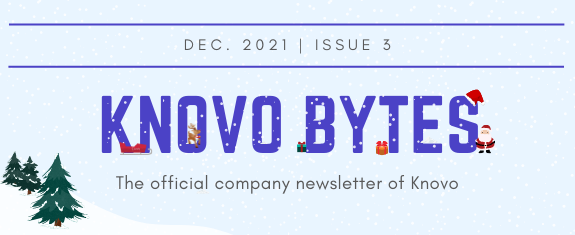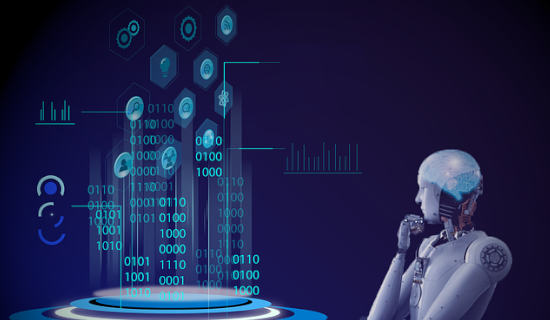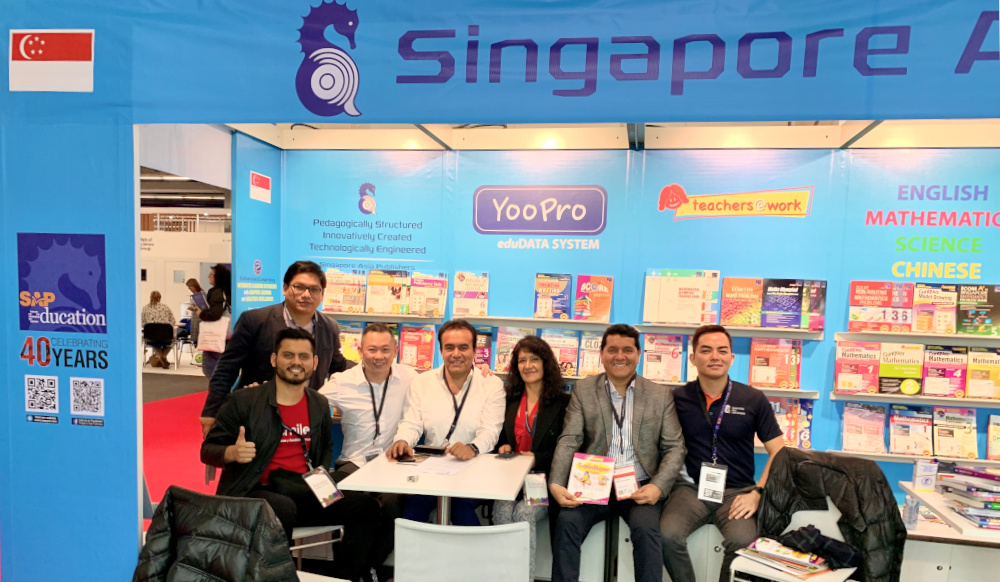
I want to take this opportunity to extend a big thank you from the Knovo Team for being part of our journey, supporting us and inspiring us to do better. In 2021, we were able to widen our reach and bring our vision of providing quality education to life. The Knovo Team wishes you and your family a blessed holiday season and a prosperous new year. We look forward to meeting you again in 2022 and unlocking new milestones together! ~Kelly Te |
|
In the past decade the integration of technology in education has increased tremendously. However, there is an upcoming shift which is focusing on not only using technology to learn but developing technology solely for improving learning on an individual level.
The vision of Singapore’s new edtech plan is using technology to make education self-directed, personalised, connected and human-centred.

Singapore has already kicked off the transition into these new learning objectives with the:
Singapore is known to have one of the best education systems in the world and with Ministry Of Education already adapting to the changing future of education, Singapore is undoubtedly on track to elevate its reputation in the education world.
Visual Capitalist, How Technology is Shaping the Future of Education, https://www.visualcapitalist.com/how-technology-is-shaping-the-future-of-education/
Ministry of Education Singapore, Educational Technology Plan, https://www.moe.gov.sg/education-in-sg/educational-technology-journey/edtech-plan
Founded in 1977, Singapore Asia Publishers (SAP) is a leading educational publisher specializing in academic materials such as textbooks, supplementary workbooks, guidebooks, reference books, dictionaries and other educational materials. SAP has successfully educated more than 25 million students and over 80% of Primary and Secondary schools in Singapore use at least one SAP material for classroom learning. They strive to support learning for our next generation through high quality, innovative and creative educational products and services. For more information, visit www.sapgrp.com.
Do you want to give a brief background on how SAP got started and the vision for your company?
Before Mr Yoo Tiang Chu started the company in 1977, he was a Biology and Chinese Language teacher with the MOE. His love for teaching led him to create many practice questions for his students to enhance their understanding in the subjects and excel in their examinations. Eventually, he took the bold move of leaving his stable teaching position and started his own publishing company, creating quality K to 12 assessment books for students in Singapore. To date, SAP has created more than 3000 titles. Not only do the materials support the classroom education of the students in Singapore, but they have also helped many students across 65 countries.
Committed to your learning, SAP endeavours to work with educational partners worldwide, to continually train children to read extensively, use technology and scientific knowledge appropriately, and apply mathematics intelligently to real-world situations.

Given that Singapore is moving towards a more digitized learning with focus on personalised and self-paced learning, how is SAP adapting to these changes?
Even though SAP’s main focus will always be on delivering the best possible content for students, we are aware the way content is being consumed is always changing. In order to stay in line with all digital changes we partnered up with EdTech companies so that we can offer a hybrid learning approach for our students.
Along with this, the majority of our customers are interested in printed materials but we are aware it’s very important to stay ahead of the game. We embrace change and digitalisation and always strive to use all new available tools in order to achieve our mission to support the learning of our next generation through high quality, innovative, and creative educational products and services.
Covid-19 has had a huge impact on every industry. Did this pandemic situation shape any new turns in your strategies or open any new and interesting opportunities?
The pandemic definitely had an impact on our industry as well, but we managed to quickly adapt. We focused on bringing our customers to our eCommerce channels during the circuit breaker and paid off. The way customers consume our materials changed as well with more and more customers opting for our e-Books instead and signing up for online classes taught using our content.
Do share with our Knovo audience on your shift from traditional print distribution to expanded range of products. What has evolved since?
For nearly 45 years, SAP has been a traditional publisher producing print books for learners. As technology advances, SAP strongly believes that technology can help learners better understand and sharpen their skills when the right amount of technology is blended together with the print books as a holistic tool for learners. As such, SAP has innovatively created educational books that are infused with web links, videos and online resources to further strengthen the knowledge of the learners. SAP has also introduced an analytics platform called Analytics Intelligence (AI), to assess the strengths and weaknesses of the learners when they complete the topical questions in the print books and attempt the revision tests on the AI platform. Upon completing the revision tests, SAP’s AI platform will generate a report showing the learners’ strengths and weaknesses in the topics that they are supposed to learn. After which, the platform will push questions to the learners for further practice on the topics that they are weak in. Ever since, SAP has evolved from a traditional print publisher to a hybrid publisher combining educational books with the right educational technology.
Any shout outs to our Parents and Student audiences?
We’d like to thank all students, parents and teachers for the support and for always recommending our books. Visit www.sapgrp.com during the month of December for a discount of up to 75%, FREE worksheets and other helpful materials.

A study conducted in New Zealand aimed to analyse the effect of a 6-week holiday break before a new school year which coincides with the winter break in Singapore. It included middle school students from different ethnicities and socio-economic backgrounds. The model analysed their writing performance trajectories and compared it across different time frames in the school year. It was observed that there was a ‘drop in performance of about half the gain achieved during the school year’. The negative impact of school holidays is substantially higher in writing performance compared to reading or mathematics. Areas of studies that rely more on memorisation and procedural skills are more impacted than areas that require more conceptual understanding such as mathematical concepts and reading comprehension.
The solution does not lie in reducing holiday time or assigning excessive amounts of homework as holidays serve many benefits for parents and educators. It is necessary for students to keep their minds active during these breaks in creative manners to widen their skillset. There are endless opportunities for students from learning new sports, engaging in thoughtful games such as chess and consistently getting out in nature. These activities aim to stimulate children’s minds while also developing key non-academic skills.
This holiday season we can collectively help our children boost their learning by ensuring continual learning in areas that require constant working on. By doing so, we can make sure that our students’ hard work throughout the school year is not lost and they return to their new classes prepared to excel.
Teresa E Alexandre Soares Dos Santos – Iniciativa Educação, The Impact of Holidays on Learning to Write, https://www.iniciativaeducacao.org/en/ed-on/ed-on-articles/the-impact-of-holidays-on-learning-to-write
By entering your email address, you will receive promotional updates, relevant content, products and services from Knovo. You may unsubscribe from these communications at any time. View privacy policy.